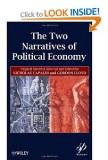The Two Narratives of Political Economy

|
Title | The Two Narratives of Political Economy |
| Author | Nicholas Capaldi, Gordon Lloyd | |
| Reviewer | Art Carden | |
| Review Date | April 28, 2012 | |
| Publisher | Wiley-Scrivener | |
| Year | 2011 | |
| Rate this Book |
“The two competing narratives are the Lockean (liberty) narrative (but made canonical by Smith) and the Rousseauean (equality) narrative (but made canonical by Marx)” (xxxii).
In The Two Narratives of Political Economy Nicholas Capaldi and Gordon Lloyd bring together a selection of readings on the two most important themes in political economy dating back to John Locke and Jean-Jacques Rousseau: liberty and equality. They have assembled what will be a very useful reader for courses in the history of economic thought, political theory, and social theory writ large. They also frame the debate in terms that should influence scholars who study the development of economic, political, and social institutions. To select, modify, and in some cases translate passages representing some of the central themes in the discussion as it proceeded over the eighteenth and nineteenth centuries represents a significant editorial contribution.
Capaldi and Lloyd divide the book into three parts: “The Emergence of Political Economy,” “The Arrival of Political Economy,” and “The Maturation of Political Economy.” An uncollected fourth section—indeed how I think about this review—might have been called “The Completion of Political Economy” or “The Close of Political Economy,” or perhaps, more self-consciously provocative (and hyperbolic), “The End of Political Economy.” I will say more on this missing section below.
The starting point for the editors’ analysis is the emergence of political economy out of the domain of “household management” and into social analysis, a move that was effected in part through the writings of John Locke and Jean-Jacques Rousseau. With Locke and Rousseau and their successors the unit of analysis of political economy shifted from the individual acting within the confines of a household economy and to the “nation” acting in the context of a broader global economy.
From Locke and Rousseau, Capaldi and Lloyd take us through contributions from Smith, Tocqueville, Saint-Simon, Robert Owen, Friedrich List, Proudhon, J.S. Mill, Marx, Engels, and some of the documents surrounding the American and French Revolutions (the American Declaration of Independence, the French Declaration of the Rights of Man and Citizen, the French constitutions of 1791, 1793, and 1795, and other documents). Scholars who are interested in the causes and consequences of institutions—specifically in the sense in which they are defined by Douglass C. North as the formal rules, informal norms, and enforcement characteristics that define the “rules of the game”—will find the juxtaposition of the American state papers with the French Revolutionary documents illuminating. This is particularly so in light of the discussions from Locke, Rousseau, Smith, and Tocqueville that precede them. I can see a very interesting classroom discussion beginning with the principles expounded by Locke and Rousseau, the specific text of some of the documents presented, and an evaluation of the kinds of incentives inherent in those documents.
The introductory essays—including the general introduction and the introductions to each section— helpfully prepare the reader for what he will encounter. I learned much from them. The editors begin by discussing “the Technological Project,” which they call “the most important historical development in the last four hundred years” (xiii), and what accompanied it: the free market economy, limited government, rule of law, and a culture of personal autonomy (they note that the latter is not a libertine “culture of self-indulgence”). One of the seismic shifts, according to the editors, was the view that all men (and eventually, women) are equal in the eyes of God and the law and that to erect “legal barriers in the economic realm was tantamount to thwarting God’s plan” (xvi). From all this emerged “a new persona—the entrepreneur.”
Unfortunately, and hence my wish for that missing fourth section of the book, they do not carry their discussion of the entrepreneur through the contributions of late nineteenth and early twentieth century scholars, particularly those working in the neoclassical and Austrian traditions. The editors assume up front that people have easy access to the twentieth and twenty-first century versions of the narratives, and thus the book ends with Friedrich Engels’ Socialism: Utopian and Scientific. This choice of stopping place weakens the volume as a whole, as the marginalists and especially those who followed in the tradition of Carl Menger (most specifically Ludwig von Mises and Friedrich Hayek) provided concrete answers to some of the questions raised by the two narratives in the eighteenth and nineteenth centuries. Most specifically, the contributions of Mises and Hayek to the socialist calculation debate show that a socialist society cannot function as an economic system. The impossibility of economic calculation under socialism has important implications for how we evaluate alleged tradeoffs between liberty and equality.
William Stanley Jevons, Leon Walras, and Carl Menger independently contributed marginal analysis to the science of political economy even before Engels published Socialism in 1880. Marginal analysis enabled future generations of scholars to develop complete theories of money and prices that were absent from the work of the classical economists and unrefuted by Marxists. Reading through the book, I found myself frustrated by the fact that there are a lot of questions raised by the authors assembled in this volume that are answered by scholars such as Mises, Ronald Coase, Hayek, and others, who are not included in the volume. A section containing some of these contributions with an introductory essay like those that bring the reader into the other sections would have made for a more complete discussion.
Nonetheless, the book is impressive for its topical breadth. One particularly useful inclusion is John Locke’s “A Letter Concerning Toleration.” The letter is especially interesting in that it recognizes, as Hayek would later, that the animating contest of liberty is a search process whereby the institutions that work are discovered through trial and error. This passage from Locke is instructive as one considers the difference between pure religion (with an internal focus) and impure religion (with an external focus): “No way whatsoever that I shall walk in against the dictates of my conscience will ever bring me to the mansions of the blessed; I may grow rich by an art that I take not delight in; I may be cured of some disease by remedies that I have not faith in; but I cannot be saved by a religion that I distrust and by a worship that I abhor. … In vain, therefore, do princes compel their subjects to come into their Church communion, under pretence of saving their souls. If they believe, they will come of their own accord, if they believe not, their coming will nothing avail them” (39). Intriguingly, Rousseau argues in a different vein (foreshadowed by Hobbes) that the separation of church and state is disadvantageous because no man can serve two masters: in this case, the state and the church.
In the end, The Two Narratives of Political Economy helps us understand the major themes that have shaped the history and ongoing development of political economy. Presumably, modern nation-states were instituted among men in order to secure the blessings of liberty; their general historical failure to do this suggests that we might want to turn our attention to other social institutions to understand how liberty and equality are best secured. The twenty-first century version of the Lockean narrative, particularly as it is being developed by economists at George Mason University and elsewhere, is turning scholars’ attention toward the mechanisms by which governance emerges from voluntary cooperation. In this light, I’ll be very interested in seeing what an updated edition of this volume might look like in another decade or two.
Art Carden is Assistant Professor of Economics at Samford University in Birmingham, Alabama and a Research Fellow with the Independent Institute. Previously, he was Assistant Professor of Economics at Rhodes College in Memphis, Tennessee. His research has appeared in journals like the Journal of Urban Economics, Public Choice, and Contemporary Economic Policy, and he is a regular contributor to Forbes.com and the Washington Examiner.



